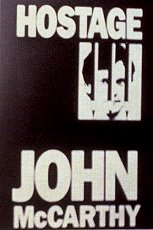
The Beating
of McCarthy
Following last year's
climactic release of Western hostages
in Beirut, a controversial new docu-drama beats
John McCarthy to his own story. Andrew Billen talks to
actor Colin Firth about his role as the captive journalist.
|
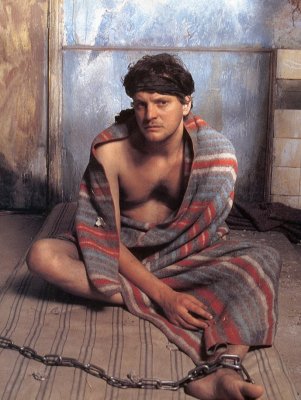
|
During the long
incarceration of the Western hostages in Beirut, we must all have asked
ourselves the same questions. Could we have coped? Would we have lasted
the course, and if so, what shape would we be in at the end? Would the
truths we had learnt about ourselves not have shattered that fragile
arrangement of instincts and artifice that our friends and family
recognise as our personality?
The loneliness, the sensory deprivation, the physical torture of
beatings, the psychological torture of not knowing from day to day
whether you were going to be released or executed made the ordeal of
hostages a late 20th-century version of hell. Except that the cells
they were held in were deep in a city that, strafed by two decades of
civil war, was already a paradigm of hell.
When it comes to portraying Hades, these days we do not hang about for
a Milton or a Dante. We wait only for television, a remorseless
manipulator and interpreter of our dreams, or in this case our
nightmares. And we do not have to wait long. This month comes Hostages, a co-production between
ITV’s Granada and America’s cable channel HBO. It is that most
controversial of genre hybrids, a docu-drama, detailing the captivity
of John McCarthy, Brian Keenan, Terry Waite, Tom Sutherland, Terry
Anderson and Frank Reed. Although it has been almost two years in the
making, it has beaten the hostages’ own accounts into the public
domain, and some, like Keenan and McCarthy, are unhappy. McCarthy has
said through his literary agent: ‘I am distressed that anyone should be
trying to portray my story when I haven’t been able to tell it myself.’
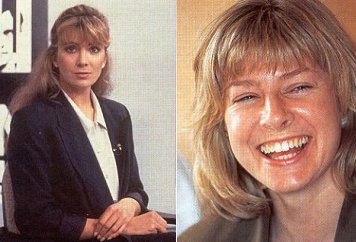 Colin Firth plays the young English television
journalist captured by Islamic terrorists and held for 1,943 days until
he emerged, seemingly unscarred, last summer. (His girlfriend Jill
Morrell will be played by Natasha Richardson.) My meeting with Colin
Firth is dominated by the amiable but insistent assertion that John
McCarthy is wrong. Colin Firth plays the young English television
journalist captured by Islamic terrorists and held for 1,943 days until
he emerged, seemingly unscarred, last summer. (His girlfriend Jill
Morrell will be played by Natasha Richardson.) My meeting with Colin
Firth is dominated by the amiable but insistent assertion that John
McCarthy is wrong.
‘I think if I was John McCarthy, a professional story-teller, I’d say
“hands off” too,’ he says. ‘I’d be amazed if he said anything else,
quite frankly. But people have got to be able to tell stories. The
professional storytellers of this world, be they journalists,
novelists, singers or actors, are always going to tell stories about
events which are provocative, inspiring, uncomfortable or capture the
imagination in some way—as this certainly does.’
Colin’s point is that since the hostage crisis was not something lived
through only by the hostages, its interpretation cannot be left
exclusively to them either. ‘It’s not just that you put yourself in
their place,’ he says. ‘It had a bizarre way of relating to things in
people’s lives. When you dig a bit, people compare experiences of their
own to being a hostage: the traps imposed by our own fears of daring,
of change, of losing people, our careers or our security.
‘I’m constantly going through my life wondering what my traps are,
wondering what I am choosing to do and what I am doing because I have
always done it—both in my career and personal life.’
He does not elaborate, but it becomes clear that Colin is almost
neurotically anxious not to be trapped, for example, by Hollywood. His
private life is not entirely his own. He lives in Hackney, east London,
but has a two-year-old son Billy who lives in Vancouver with Colin’s
former partner, actress Meg Tilly, whom he visits frequently.
We meet in London four weeks after Colin has completed Hostages. The 1988 BBC
drama-documentary Tumbledown,
in which he played Robert Lawrence, a career soldier crippled in the
Falklands, has just been repeated, but he is well-known anyway as the
clean-cut lead of A Month In The
Country and Valmont.
At 31, he has the sort of good looks designed by nature to fascinate
women more than men. Asked earlier if she minds Colin using her office
for the interview, a Granada press officer says she would quite happily
let him sit on her lap throughout.
Arriving slightly late, dressed in a baggy pink and grey T-shirt and
jeans, he does not look like a man who has returned from hell, although
some of the physical indignities he underwent during the filming sound
hellish enough.
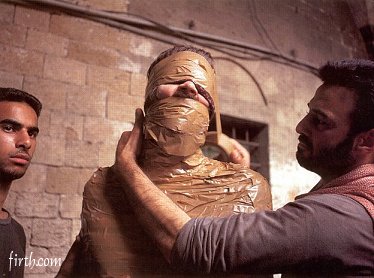 
‘The hostages were
wrapped up like mummies in grey parcel tape from ankles to nose. They
were transported for eight hours like that in coffin-like drawers in a
lorry. It nearly killed them. Jean-Paul Kauffmann, the French hostage,
was there for more than 10 hours and asked them to kill him,’ he says.
‘It wasn’t until the tape was wrapped above my hands, which were by my
side, that I realised how trapped I was beginning to feel, and it
wasn’t till it got past my neck and chin that I realised it was going
to get even worse. It robs you of your physical sense of yourself...’
He breaks off, aware of how he might be sounding: ‘I know it always
sounds terribly precious when an actor talks like this. Someone has
been through this for five years and an actor does it for the cameras
and says, “Absolutely horrific, I must go into therapy.” But it gave me
a clue. And you apply your imagination, so you are not thinking about
going off and having a shower back at the hotel. You are thinking: what
would I be feeling now if it was for real?’
The magic of acting is to summon before an audience a life that has
normally never existed. The voodoo is more not less in conjuring one
that still does. Like everyone else, Colin had seen McCarthy on
television after his release, ironic, composed, exhilarated, speech
slurring from the drugs he had been given. But it was very little on
which to base a performance. The John McCarthy he plays is a product of
three imaginations: his own, director David Wheatley’s and writer
Bernard MacLaverty’s, all based on perceptions of a man they never met.
When Colin played Robert Lawrence in Tumbledown,
Lawrence was on set almost all the time. It had not always, he says,
been helpful. As it happens he feels slightly closer to McCarthy
because he can imagine himself being a journalist while he would almost
rather die than be a soldier.
Yet he has less in common with him than you might guess. McCarthy’s
public school sangfroid and undergraduate larkishness do not come
naturally to Colin, who is alternately defensively jokey and gravely
passionate over serious issues (over lunch later we plunge into
pacifism, Thatcherism, penal reform and the tabloids). Although he is
always playing public school types, he is a secondary modern boy who
failed the 11-plus and went to school in, rather than at,
Winchester—though programme notes sometimes fudge it. His education was
completed at drama school, not university. If he had been thrown into a
Lebanese cell, he would have brought with him a different set of
psychological and social baggage.
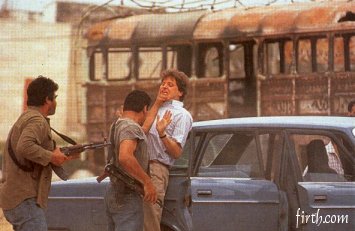 ‘Quite frankly,’ he says of McCarthy’s captivity, ‘I
don’t think I would have been as brave.’ Nevertheless, in the film John
McCarthy, normally composed, breaks down at an early point. Stripped,
manacled, hit on the face by fist and rifle butt, he ‘freaks out’. On
another occasion he cracks after seeing cockroaches in his cell. The
scenes sound distressing to act and distressing to watch and remind me
of the only part of Tumbledown
that made me uneasy: where Lawrence is in bed with his former
girlfriend and loses control of his bowels. In the case of Tumbledown, however, the
justification was absolute, for Lawrence himself insisted that the
scene should stay. ‘Quite frankly,’ he says of McCarthy’s captivity, ‘I
don’t think I would have been as brave.’ Nevertheless, in the film John
McCarthy, normally composed, breaks down at an early point. Stripped,
manacled, hit on the face by fist and rifle butt, he ‘freaks out’. On
another occasion he cracks after seeing cockroaches in his cell. The
scenes sound distressing to act and distressing to watch and remind me
of the only part of Tumbledown
that made me uneasy: where Lawrence is in bed with his former
girlfriend and loses control of his bowels. In the case of Tumbledown, however, the
justification was absolute, for Lawrence himself insisted that the
scene should stay.
Portraying McCarthy’s hysteria, Colin says, does not impugn his
courage; it is the greatest bravery of all to be shaking and in tears
and still be polite and help others and to recover. Nevertheless, we
have no way of knowing if McCarthy will mind until after transmission.
The best we can say is that Granada believes McCarthy’s collapse did
actually happen. Alasdair Palmer, a former World In Action researcher who
worked on a previous docu-drama on Lockerbie, spent 18 months
researching Hostages before
handing over the facts for MacLaverty to do dramatise. He spoke to all
the hostages except Terry Anderson and Terry Waite, even briefly to
Keenan and McCarthy, and his major sources were Frank Reed and Tom
Sutherland. Granada’s press officer Barbara O’Brien, who for some
reason chaperons Colin during our discussion, insists every scene is
factual although dialogue has been invented.
‘I was very, very concerned when I found out that McCarthy wasn’t
endorsing it,’ Colin says. ‘I was very concerned they were making
something so soon after the event and if I hadn’t found myself
reconciled to it all in the end I wouldn’t have done it. I think the
script is honest and the only things that have irritated the shit out
of me so far have been the aspersions on the integrity of the people
involved.’
Hostages sounds promising. In place
of a facile TV-movie message about the indomitable human spirit, Colin
promises a focus on the ‘extraordinary nature of human
relationships—everything compressed into a little room: the dynamics,
the love, the rejections, the irritations. Someone described it as like
fives years’ enforced group therapy.’
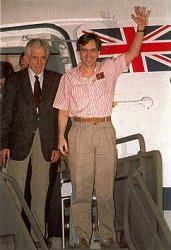 He confesses, however, he has no real
idea of the programme will succeed. He is worried that much of the
humour, particularly between the Irish Keenan (‘a voice in the
wilderness character’) and McCarthy (‘the most popular boy in the
school’) was cut even before it could be shot. In the past he has been
unable to predict the reception his work will receive. A Month In The Country, bedeviled
by a wet English summer, felt like a disaster and yet it worked. Tumbledown, a film in which he
invested everything emotionally, disappointed him. He confesses, however, he has no real
idea of the programme will succeed. He is worried that much of the
humour, particularly between the Irish Keenan (‘a voice in the
wilderness character’) and McCarthy (‘the most popular boy in the
school’) was cut even before it could be shot. In the past he has been
unable to predict the reception his work will receive. A Month In The Country, bedeviled
by a wet English summer, felt like a disaster and yet it worked. Tumbledown, a film in which he
invested everything emotionally, disappointed him.
There is, nevertheless, one judgment on Hostages Colin will not be prepared
to accept: that of the real John McCarthy. ‘I couldn’t possibly afford
to,’ he says. ‘I know that he’s going to say it wasn’t like that, and
it won’t have been like that. But it’s some sort of ghost we are
raising, a dream image for our understanding of a shared experience,
just like the Falklands. I really don’t see this as pure entertainment.
It’s more like a need, a need to scratch an itch.’
Hostages will be shown
on ITV at the end of September.
|


 Colin Firth plays the young English television
journalist captured by Islamic terrorists and held for 1,943 days until
he emerged, seemingly unscarred, last summer. (His girlfriend Jill
Morrell will be played by Natasha Richardson.) My meeting with Colin
Firth is dominated by the amiable but insistent assertion that John
McCarthy is wrong.
Colin Firth plays the young English television
journalist captured by Islamic terrorists and held for 1,943 days until
he emerged, seemingly unscarred, last summer. (His girlfriend Jill
Morrell will be played by Natasha Richardson.) My meeting with Colin
Firth is dominated by the amiable but insistent assertion that John
McCarthy is wrong.

 ‘Quite frankly,’ he says of McCarthy’s captivity, ‘I
don’t think I would have been as brave.’ Nevertheless, in the film John
McCarthy, normally composed, breaks down at an early point. Stripped,
manacled, hit on the face by fist and rifle butt, he ‘freaks out’. On
another occasion he cracks after seeing cockroaches in his cell. The
scenes sound distressing to act and distressing to watch and remind me
of the only part of
‘Quite frankly,’ he says of McCarthy’s captivity, ‘I
don’t think I would have been as brave.’ Nevertheless, in the film John
McCarthy, normally composed, breaks down at an early point. Stripped,
manacled, hit on the face by fist and rifle butt, he ‘freaks out’. On
another occasion he cracks after seeing cockroaches in his cell. The
scenes sound distressing to act and distressing to watch and remind me
of the only part of 